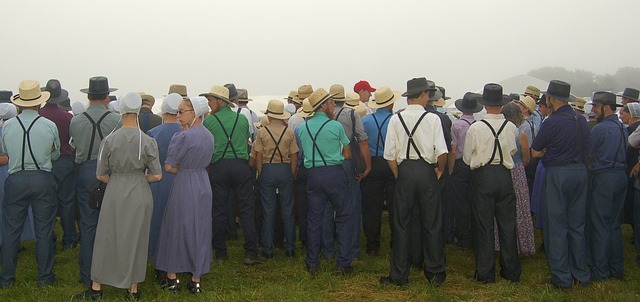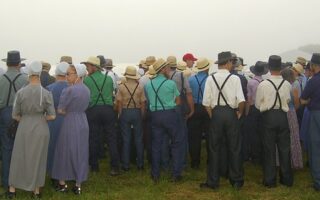Amish people generally do not consume coffee as it is considered a worldly pleasure and goes against their traditional beliefs and values.
Table of Contents
The Cultural Significance of Coffee in Amish Communities
Do Amish people drink coffee? This is a question that many people have when it comes to understanding the cultural practices of the Amish community. Coffee has become a staple in many households around the world, but what about in Amish communities? Let’s take a closer look at the cultural significance of coffee in Amish communities.
The Amish are known for their simple and traditional way of life. They value simplicity, hard work, and community. Their lifestyle is rooted in their religious beliefs and their desire to live separate from the modern world. This includes their dietary choices and the beverages they consume.
In Amish communities, coffee is not a common beverage. The Amish believe in living a simple life and avoiding worldly pleasures. They see coffee as a stimulant that can lead to addiction and dependency. Instead, they prefer to drink herbal teas, milk, and water. These beverages are seen as more natural and in line with their values.
However, it’s important to note that not all Amish communities have the same beliefs and practices. Some Amish individuals may choose to drink coffee, but it is not the norm. It is more common to find coffee being consumed in Amish businesses that cater to non-Amish customers, such as restaurants or bed and breakfasts.
The cultural significance of coffee in Amish communities goes beyond just the beverage itself. Coffee is often seen as a symbol of the modern world and the fast-paced lifestyle that the Amish choose to avoid. By abstaining from coffee, the Amish are making a statement about their commitment to their values and their desire to live a simpler life.
In addition to the cultural significance, there are also practical reasons why coffee is not commonly consumed in Amish communities. The Amish value self-sufficiency and often grow their own food. Coffee, on the other hand, is not a crop that can be easily grown in the climate of many Amish settlements. This makes it less accessible and less practical for them to consume on a regular basis.
While coffee may not be a common beverage in Amish communities, it does not mean that the Amish are completely opposed to it. Like any other cultural practice, there are variations and individual choices within the community. Some Amish individuals may choose to drink coffee on occasion or in moderation, while others may abstain completely.
In conclusion, the cultural significance of coffee in Amish communities is rooted in their desire for simplicity and their commitment to living a separate lifestyle from the modern world. While coffee is not a common beverage in Amish households, there may be variations and individual choices within the community. Ultimately, the decision to drink coffee or not is a personal one for each Amish individual.
Exploring the Health Effects of Coffee Consumption among the Amish

Do Amish people drink coffee? It’s a question that many people have wondered about. The Amish are known for their simple and traditional way of life, and coffee may not seem to fit into that picture. However, the answer is not as straightforward as you might think.
Coffee is a popular beverage around the world, enjoyed by millions of people every day. It provides a much-needed boost of energy and is often seen as a social drink. But for the Amish, who value simplicity and community, coffee may not be a part of their daily routine.
The Amish lifestyle is centered around their faith and their community. They believe in living a simple life, free from modern conveniences and distractions. This means that they do not use electricity, drive cars, or have televisions. So it’s not surprising that coffee, with its association with the fast-paced and modern world, may not be a part of their lifestyle.
But what about the health effects of coffee? Many studies have been conducted to explore the impact of coffee consumption on health. Some research suggests that coffee can have positive effects, such as reducing the risk of certain diseases like Parkinson’s and Alzheimer’s. It may also improve cognitive function and boost metabolism. However, other studies have found negative effects, such as increased heart rate and blood pressure.
For the Amish, who prioritize their health and well-being, the potential health effects of coffee may be a consideration. They may choose to avoid coffee in order to maintain their simple and healthy lifestyle. Instead, they may opt for other beverages, such as herbal teas or homemade fruit juices.
Another factor to consider is the social aspect of coffee. In many cultures, coffee is a social drink, enjoyed with friends and family. It’s a way to connect and bond with others. But for the Amish, who value community and togetherness, coffee may not be necessary for socializing. They have other ways of coming together, such as community meals and gatherings, where they can connect with each other without the need for coffee.
In conclusion, while coffee is a popular beverage enjoyed by many people around the world, it may not be a part of the Amish way of life. The Amish prioritize simplicity, community, and health, and coffee may not align with these values. They may choose to avoid coffee in order to maintain their traditional lifestyle and focus on other beverages that are more in line with their beliefs. So the next time you wonder if Amish people drink coffee, the answer is likely no. But don’t worry, they have plenty of other ways to enjoy each other’s company and stay healthy.
Coffee Alternatives in Amish Lifestyle: Traditional Beverages
Do Amish people drink coffee? This is a question that many people have when they think about the Amish lifestyle. The Amish are known for their simple and traditional way of life, and coffee may not seem to fit into that picture. However, the answer to this question is not as straightforward as you might think.
In the Amish community, coffee is generally not consumed. This is because the Amish believe in living a simple and humble life, and they view coffee as a luxury that goes against their values. Instead of coffee, the Amish have a variety of traditional beverages that they enjoy.
One popular alternative to coffee in the Amish community is herbal tea. Herbal teas are made from a variety of plants and herbs, and they are often enjoyed for their soothing and calming properties. Some common herbal teas that the Amish enjoy include chamomile, peppermint, and lemon balm. These teas are often served hot and are a comforting and refreshing way to start the day.
Another traditional beverage that the Amish enjoy is sassafras tea. Sassafras tea is made from the bark of the sassafras tree and has a unique and distinct flavor. It is often sweetened with honey or maple syrup and is a popular choice among the Amish. Sassafras tea is also believed to have medicinal properties and is often used to treat various ailments.
In addition to herbal teas and sassafras tea, the Amish also enjoy a variety of fruit-based beverages. One popular fruit-based beverage is apple cider. Apple cider is made from freshly pressed apples and is often enjoyed during the fall season. It is a sweet and refreshing drink that can be served hot or cold.
Another fruit-based beverage that the Amish enjoy is grape juice. Grape juice is made from freshly squeezed grapes and is often served at special occasions and celebrations. It is a sweet and tangy drink that is enjoyed by both children and adults.
While coffee may not be a part of the Amish lifestyle, the Amish have found other traditional beverages to enjoy. From herbal teas to fruit-based drinks, the Amish have a variety of options to choose from. These beverages not only provide a refreshing and flavorful alternative to coffee but also reflect the Amish values of simplicity and humility.
So, the next time you wonder if Amish people drink coffee, remember that they have their own unique and traditional beverages that they enjoy. From herbal teas to fruit-based drinks, the Amish have found ways to satisfy their thirst without the need for coffee. So, if you ever have the opportunity to visit an Amish community, be sure to try some of their traditional beverages and experience a taste of their simple and humble way of life.
The Role of Coffee in Amish Social Gatherings and Celebrations
Do Amish people drink coffee? This is a question that often comes up when discussing the lifestyle and traditions of the Amish community. While it is true that the Amish lead a simple and traditional way of life, their views on coffee may surprise you.
Coffee, a popular beverage enjoyed by many around the world, has become an integral part of daily routines for countless individuals. However, the Amish have a different perspective on this caffeinated drink. In general, the Amish do not consume coffee as part of their daily lives. This is due to their belief in simplicity and their desire to live a life free from worldly distractions.
The Amish value community and togetherness, and this is reflected in their social gatherings and celebrations. While coffee may not be a staple in their everyday lives, it does play a role in these special occasions. During weddings, funerals, and other significant events, coffee is often served to guests as a way to provide warmth and comfort.
In Amish communities, the preparation and serving of coffee are seen as a way to show hospitality and care for others. It is a gesture of goodwill and a way to make guests feel welcome. The aroma of freshly brewed coffee fills the air, creating a cozy and inviting atmosphere.
When it comes to the actual consumption of coffee, the Amish have their own unique traditions. Instead of drinking coffee from individual cups, it is common for the Amish to use a communal coffee pot. This pot is passed around, allowing everyone to pour themselves a cup. This practice fosters a sense of unity and equality among the community members.
While coffee is not a regular part of their daily lives, the Amish do have alternatives for those who desire a warm beverage. One popular substitute is a drink called “Postum.” Made from roasted grains and chicory, Postum provides a similar taste and experience to coffee without the caffeine. It has become a favorite among the Amish and is often enjoyed during breakfast or as a comforting evening drink.
It is important to note that not all Amish communities have the same views on coffee. Some may choose to abstain from it completely, while others may allow it in moderation. The decision ultimately lies with the individual church district and the bishop who oversees it.
In conclusion, while the Amish do not typically drink coffee as part of their daily routine, it does hold a special place in their social gatherings and celebrations. Coffee is seen as a way to show hospitality and bring people together. The communal aspect of serving and sharing coffee reflects the Amish values of community and togetherness. So, the next time you find yourself in an Amish community, don’t be surprised if you’re offered a cup of coffee during a special occasion. It’s their way of extending a warm welcome and making you feel like part of the family.
Conclusion
Yes, some Amish people do drink coffee, although it is not universally accepted among all Amish communities.
For licensing reasons, we must provide the following notice: This content was created in part with the help of an AI.


